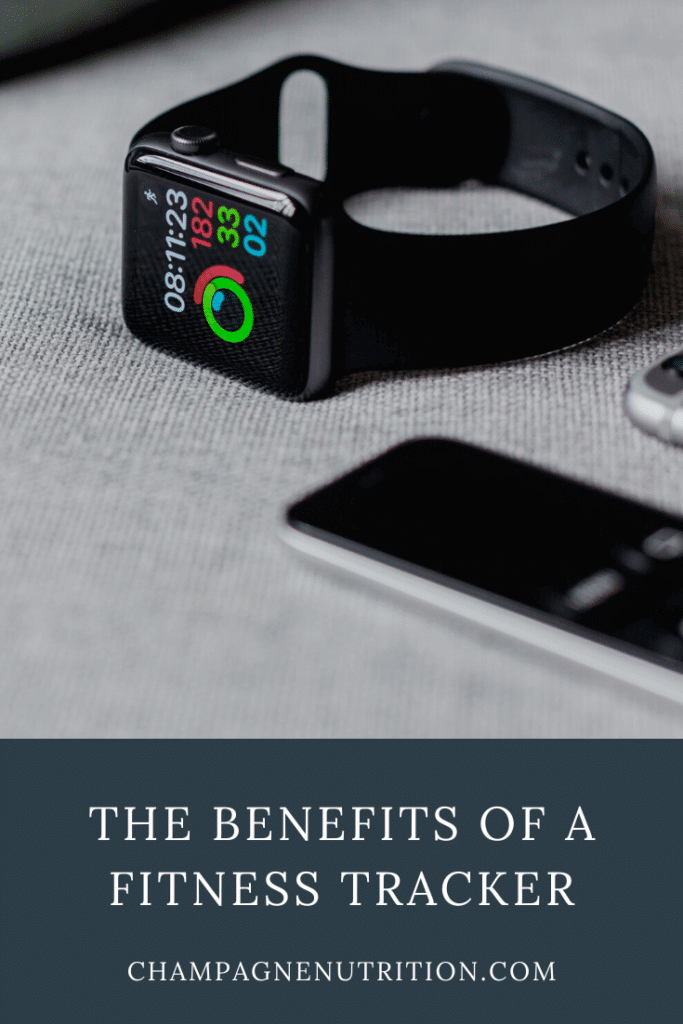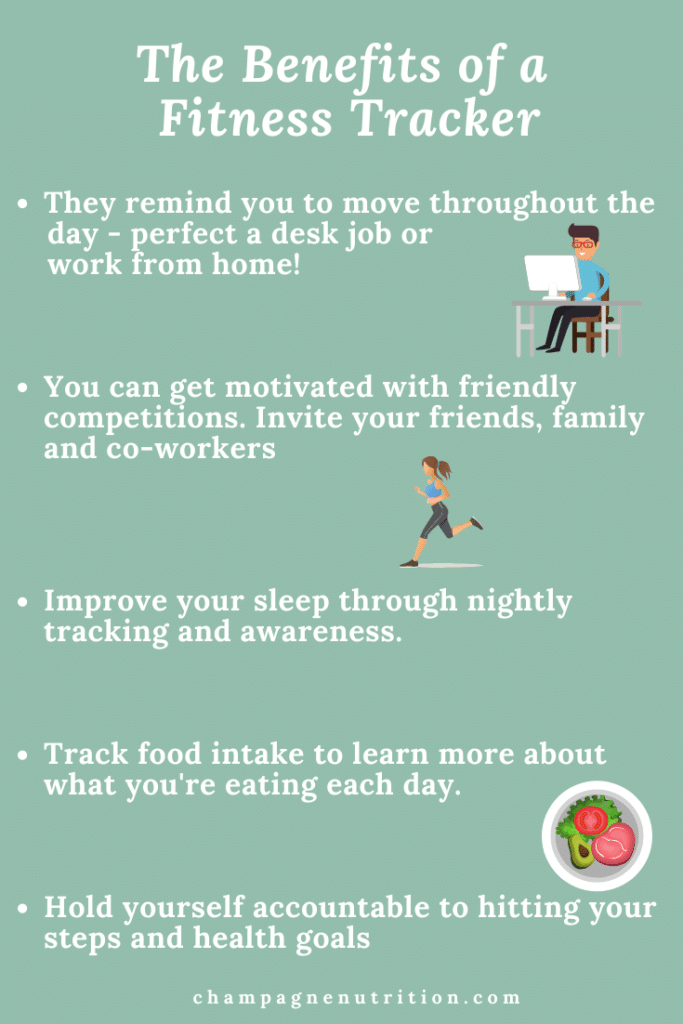The Benefits of a Fitness Tracker
November 20, 2015 by Ginger Hultin MS RDN
You’re at a fitness class and can’t help but notice the glow on people’s wrists – Apple Watches, JawBones, MisFit, Garmin, Fitbit, the list keeps going. When fitness trackers first became popular, I thought ‘why bother’? This is just a fad and what could they teach me that I didn’t know already. I heard this from my clients, too – “how will this make a difference?” I never really considered buying a tracker of my own until I was gifted one a few years ago. Then I got one and I will admit – the benefits of a fitness tracker have changed my life in a really positive way.

What is a Fitness Tracker and What Can They Tell You?
A fitness tracker is typically a wearable device (many people wear them on their wrist but there are others out there that can clip onto places like your belt or even in your hair). The tracker records your daily physical activity which is typically measured as steps but different trackers have become more developed to record spin classes, outdoor biking, swimming, dancing, and even yoga. Many of them have tiny sensors inside that record your heart and calories burned. You can even measure your sleep which can be really interesting. I was surprised as how restless my tracker had recorded by sleep and it was a good reminder to practice good sleep hygiene (get off your screen too close to bed time! The blue light interacts with sleep hormones making it difficult to get a restful sleep). One of the benefits of a fitness tracker is that is gathers very personalized data and you can actually share this information with your doctor if needed. I’ve even heard that some insurance companies may start to reward users for healthy living and fitness trackers are one way to record that data. Stay tuned for that.
Do I have to Get 10,000 Steps Everyday?
You might have heard people say “I need to get 10,000 steps in today” or “I haven’t quite hit my 10,000 steps.” For some reason, this seems to be the magical number that most fitness trackers recommend users get. There isn’t actually a ton of research around this number. It was first determined in Japan by a pedometer company and somehow got ingrained into our fitness tracker culture. There’s actually some research out there that even 4,400 steps will reduce mortality (although they did not measure quality of life parameters in this study). The national recommendation by the CDC is to get at least 150 minutes of moderate intensity exercise each week. That breaks down into a little over 20 minutes a day. If you take 10,000 steps a day, you are likely to walk around 5 miles which would cover the national recommendation. You can certainly get your activity in other ways that your fitness tracker might not pick up (swimming, biking, etc).
If you have a sedentary job, you know that getting 10,000 steps a day can be extremely difficult if you are not intentional about moving your body. Having the tracker there to remind you can be super helpful. I often recommend my clients aim for 10,000 steps and have even had step competitions with them in the past if it seems like the right fit. My steps are actually “public” so that I can have friendly competitions with friends or clients. Moving your body consistently throughout the day can promote healthier weight, balanced blood sugar, and lower your blood pressure. I work from home, and I spend a lot of time blogging and writing so mid-day if I’m at 2000 steps, I know I need to get up and move.
Are Trackers Accurate?
Trackers do not work for everyone. I mainly look at my steps and my sleep and it has taught me a lot that I needed to work on. Keep in mind that for some folks, the devices don’t capture their sleep correctly. All they do is track movement so they work for many people, but not all. My swimmers, rowers, bikers and weight lifters get frustrated that they don’t get these activities counted through their steps. The technology has improved a lot so there are actually some trackers out there that might work better for these types of activities. I heard of a man who was driving an RV across the country and the vibration of the trip was counting as steps – guess how many he got that day?
(A Few of) The Benefits of a Fitness Tracker
- They get you up and off your office chair. At 5000 steps for the day? Take the stairs, take a walk around the block, march in place on a phone call. You’ll be surprised how fast you can rack up the steps and hit that satisfying 10k vibration.
- Compete with your friends. My clients notice if I have a >20k day. They try to match me and we encourage each other. Each day, I know there are folks I care about watching me so I take more steps. Building the network that these apps make so easy is a fun way to get more out of the experience.
- Sleep WAY better. I thought I was good to go, then I started wearing my FitBit at night. I found I was sleeping about 5-6 hours per night! Wake up call – I started trying harder and now I’m back up to 7-8 and I feel way better. Fitness trackers don’t really know if you’re asleep or not (they only track movement) and they don’t work for everyone but they definitely work for me. I’m so thankful that my FitBit told me more about my sleep….or lack thereof.
- Track your food if you want to. There is great research that tracking your intake helps with weight loss or maintenance. If you like to track, you can do it all on a FitBit without having to log onto another device. Instead of tracking everything you eat, I’ve helped clients run ‘experiments’ pertaining to their goals. Some track how many sugary foods they eat or how much alcohol they drink. You could track your hydration if that is a goal – if you’re into tracking, a FitBit can help.
- They hold you accountable. If you feel that a FitBit or other tracker is accurate for you as I feel it is for me, it holds you accountable. Yes, I had a 3500 step day yesterday (working from home!) and I accept that, but at least I know. I look at trends in all of my clients – some people are <5000 people and some blast 10k every day! What kind of person are you?

Trackers can become incredibly addictive and as mentioned the accountability is one of the benefits of a fitness tracker. It’s amazing how they motivate us to get moving. Finding balance is such an important part of health and giving yourself the days off (where you might not hit 10,000 steps) is important too. Maybe even leave your tracker at home for the day. My fitness tracker has changed my life for the better and maybe it will change yours too!

Ginger Hultin,MS, RD, CSO
Thanks for visiting! If you're struggling with a cancer diagnosis, autoimmune condition, gut health problems, or even a medical mystery, nutrition can make a HUGE difference in your day-to-day life. I run a virtual, concierge private practice where I partner with my clients over time to help them improve their health through nutrition. Be sure to visit the blog for easy, plant-based, anti-inflammatory recipes and our "Resources" page for a variety of self-paced programs, books, e-books, and nutrition podcast episodes.
